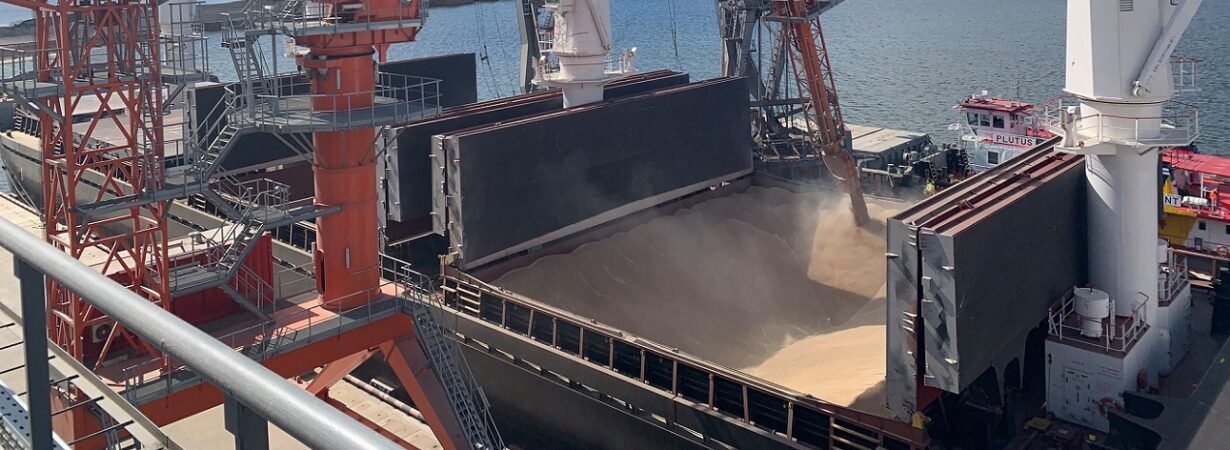MENA countries face risk of grain supply disruption as result of Russia-Ukraine conflict

Analysts point out that Russia’s invasion of Ukraine threatens to disrupt exports of commodities such as grains and oilseeds from both countries to all parts of the world including the Middle East. Moreover, the prospect of toughened sanctions against Russia could further impact grain exports, along with energy and metals supplies.
“If sanctions affect payment transactions, Russian banks and possibly also the insurance that covers Russian oil and gas deliveries, supply outages cannot be excluded,” said Commerzbank analysts.
Russia’s commodity exports could also be disrupted by buyers being unable open letters of credit from Western banks to cover purchases.
Russia and Ukraine are major wheat suppliers, accounting for a combined 29% of global exports, the bulk of which go through ports in the Black Sea.
Much of that wheat is exported to major buyers in the Middle East and North Africa such as Egypt and Turkey.
Ukraine is also one of the world’s top four corn (maize) exporters and had been shipping around 4.5 million tonnes a month with major customers including China and the European Union.
The two countries also account for about 80% of global exports of sunflower oil.
While crude oil rose above $100 per barrel for the first time since 2014, wheat jumped to a nine and a half year high, corn to an eight-month peak and aluminium soared to record highs.
Ukraine’s military has suspended commercial shipping at its ports after Russian forces invaded the country, an adviser to the Ukrainian president’s chief-of-staff said, stoking even more fears of supply disruption from leading grain and oilseeds exporters.
Russia earlier ordered the Azov Sea closed to the movement of commercial vessels until further notice, but kept Russian ports in the Black Sea open for navigation, its officials and five grain industry sources said on Thursday.
Global farm commodities trader Cargill Inc said an ocean vessel it chartered was “hit by a projectile” on the Black Sea, but that the ship remained seaworthy and all crew were safe.
Much of Ukraine’s corn exports are destined for China and the European Union. It also competes with Russia to supply wheat to major buyers such as Egypt and Turkey.
Industry estimates currently put Ukraine’s grain exports at about 5 million to 6 million tonnes a month, comprising about 4.5 million tonnes of corn, 1 million tonnes of wheat and a remaining share mainly of barley.
Main grain export ports include Chornomorsk, Mikolayiv, Odessa, Kherson and Yuzhny.
Egypt’s state grains buyer cancelled an international purchasing tender for wheat on Thursday amid reports that no offers of either Russian or Ukrainian wheat had been received.
Russian forces invaded Ukraine on Thursday in a massed assault by land, sea and air, the biggest attack by one state against another in Europe since World War Two.
“The market is still struggling to get a clear picture of the actual military situation on the ground. The ports in the Azov and Black Sea so far seem not to have been damaged according to the initial shipping agency reports,” one European grain trader said.
The trader said the market was looking out for any declarations of force majeure, meaning suppliers will not fulfil contractual obligations because of extreme circumstances.
Shipping group Maersk said on Thursday it had halted all port calls in Ukraine until the end of February and has shut its main office in Odessa on the Black Sea coast because of the conflict.
Global agricultural commodities trader Bunge Ltd said Thursday it had shuttered company offices in Ukraine and operations in its Black Sea grains port in Nikolaev, Ukraine, had been suspended.
Competitor Archer-Daniels Midland Co said its Ukraine facilities, including an Odessa export terminal, were not operating.
Russia, the world’s largest wheat exporter, mainly ships its grain from ports in the Black Sea.
The Azov Sea’s ports are shallower and have less capacity.
Mariupol, reported to be under attack from Russian forces, one of the biggest Ukrainian ports in the Azov Sea, mainly handles relatively small ships of between 3,000 to 10,000 tonnes deadweight.
The Azov Sea ports export wheat, barley and corn to Mediterranean importers including Cyprus, Egypt, Italy, Lebanon and Turkey.
Another European trader, speaking on condition of anonymity, said such countries would have to seek alternative supplies if the ships were unable to depart in the near future.
US wheat futures rose to the highest level in nearly a decade as the conflict threatened to disrupt the flow of supplies from the region while European wheat futures climbed to a record peak.
Russia produced 76 million tonnes of wheat last year and is expected by the US department of agriculture to export 35 million tonnes in the July-June season, 17% of the global total.
Ukraine asked Turkey on Thursday to close the Bosphorus and Dardanelles straits to Russian ships, the Ukrainian ambassador to Ankara said.
Turkish President Recep Tayyip Erdogan said he backed Ukraine’s territorial integrity but there was no immediate response to Kyiv’s request. It places Turkey in a difficult position as it shares a maritime border with Ukraine and Russia in the Black Sea.
Under the 1936 Montreux Convention, Ankara has control over the straits and can limit the passage of warships in wartime or if threatened.
Read also
Wheat in Southern Brazil Impacted by Dry Weather and Frosts
Oilseed Industry. Leaders and Strategies in the Times of a Great Change
Black Sea & Danube Region: Oilseed and Vegoil Markets Within Ongoing Transfor...
Serbia. The drought will cause extremely high losses for farmers this year
2023/24 Safrinha Corn in Brazil 91% Harvested
Write to us
Our manager will contact you soon



